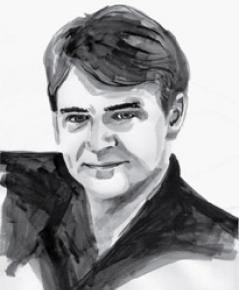
DAVID EWING DUNCAN is the author of seven books published in 19 languages, including the worldwide bestseller Calendar, and the recently released bestseller Experimental Man: What one man’s body reveals about his future, your health, and our toxic world.
He is Chief Correspondent of public radio's Biotech Nation, a contributor to Fortune, and a columnist for MIT Technology Review. He is also the Director of the Center of Life Science Policy at UC Berkeley. He has been a contributing editor for Wired, Discover and Conde Nast Portfolio, and also writes for The New York Times, National Geographic, Harper’s, The Atlantic, the San Francisco Chronicle, and many other publications.
He is a former special correspondent and producer for ABC Nightline and a correspondent for NOVA’s ScienceNOW! He has won numerous awards including the Magazine Story of the Year from the American Association for the Advancement of Science. His articles have twice been cited in nominations for National Magazine Awards, and his work has appeared twice in The Best American Science and Nature Writing. He is a graduate of Vassar College and now lives in San Francisco.
Recent Stories By David Ewing Duncan, The Fiscal Times:
-
Bionic Eyes That Can Help the Blind SeeJune 24, 2011
What if I told you that a device exists that uses a mini-camera embedded in a pair of glasses to feed images directly into the brain of a blind person? And what if this device could earn hundreds...
-
Cars with Brains: Boosting the IQ of AutomobilesJune 8, 2011
Imagine traffic one day behaving like dense schools of fish, which turn and maneuver in a synchronized flash of color without collisions, confusion, or delays. Fish have a natural system of sensors...
-
Investment Idea # 3: Rewiring the SunMay 18, 2011
Minnesota is not known for its endless days of sunshine. But it soon may be known as a hotspot for energy emanating from the sun. This is thanks to Minneapolis-based TenKsolar, a start-up that has...
-
New Drugs at Lower Costs--Investing in GrowthApril 6, 2011
Overall Grade: B- In 1996, a patient In a North Carolina hospital was given antibiotics for an infection that had been treated successfully for years. But this time, the drugs didn’t...
-
Green Crude: Can Algae End Our Oil Addiction?March 8, 2011
This is the first in a series of columns that will report on 100 great ideas for innovation in America and around the world — how they are being funded and by whom, or whether the idea will pay...
-
Bay Area Voters View Key Elections with Apathy, YawnsOctober 26, 2010
SAN FRANCISCO – For an election that has all of the drama, the oddball characters and the campy flare of a Hollywood spectacle, the California midterm campaigns have generated a surprisingly tepid...
-
New Study Says America is Losing its Innovative EdgeAugust 25, 2010
America 3.0 is a new column that assesses fiscal issues across America as if this nation were a company and its citizens were stockholders. The column will delve into subjects ranging...
-
Who Dies Best? A Survey of 40 CountriesJuly 22, 2010
For the past two or three centuries, the focus of our greatest minds has been on creating governments, technologies and institutions that support the ideal of longer, fuller and healthier lives –...
-
Bio-Research: Not Much to Show for a Big Investment...YetJuly 15, 2010
America 3.0 is a new column that assesses fiscal issues across America as if this nation were a company and its citizens were stockholders. Each business plan offers a formal set of goals and...
-
The American Business Plan--Oil: Time to RebootJune 16, 2010
America 3.0 is a new column that assesses fiscal issues across America as if this nation were a company and its citizens were stockholders. Each business plan offers a formal set of goals and...
-
The American Business Plan--Oil: Time to RebootJune 16, 2010
America 3.0 is a new column that assesses fiscal issues across America as if this nation were a company and its citizens were stockholders. Each business plan offers a formal set of goals and...
-
Life at All Costs: Part Five, The SolutionsMarch 16, 2010
The day that Terry Shinkle died of lung cancer, he fancied himself on a journey, driving with his teenage grandson from their home near Kansas City to visit Purdue University. “Are we there yet?” he...

